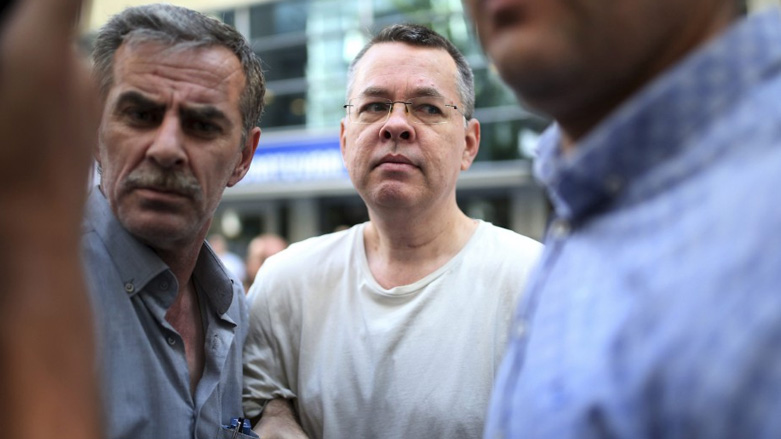US threatens more sanctions on Turkey if Brunson not released

WASHINGTON DC (Kurdistan 24) - Both the White House and State Department continued to express an uncompromising position toward Turkey on Tuesday, demanding that Ankara release US Pastor Andrew Brunson, whom it detained in October 2016, following July’s abortive coup attempt.
Most dramatically, a White House official told Reuters, “The president is 100 percent committed to bringing Pastor Brunson home, and if we do not see actions in the next few days or a week, there could be further actions taken.”
Such actions would likely be additional economic sanctions, the official said, adding, “the pressure is going to keep up if we’re not seeing results.”
On Monday, National Security Council Advisor, John Bolton, met with Turkey’s ambassador to Washington, Serdar Kilic. Bolton told Bilic that the administration was fixed on Brunson’s release, Reuters reported.
On Tuesday, White House Spokesperson, Sarah Sanders, explained that President Donald Trump feels “a great deal of frustration” over the fact that Brunson has not been released, “as well as the fact that other US citizens and employees of diplomatic facilities have not been released.”
Sanders’ statements are particularly significant because, with the crisis in relations between the two NATO allies, the White House appears to have taken firm charge over US dealings with Ankara.
At the State Department, Spokesperson Heather Nauert struck a tone similar to Sanders’. Asked what the US would view as progress in resolving the dispute, she replied, “Progress is having Pastor Brunson on a plane, coming back to the United States.”
On Tuesday, Turkish President Recep Tayyip Erdogan called on Turks to “boycott” US electronic goods, but US officials seemed unconcerned.
Sanders said that she had no “policy announcement” in response, while Nauert remarked, “We’ll wait and see.”
Despite the continuing stalemate and threat of further US sanctions, the value of the Turkish Lira increased slightly on Tuesday, rising 8 percent from Monday’s record low, to 6.3 Lira to the dollar.
Trump administration officials are also pointing out that the basic reason for the Lira’s collapse is not so much what the US has done as it is long-standing flaws in Turkish economic policies.
Only one US measure directly affects Turkey’s economy: Trump’s decision to increase tariffs on the import of Turkish steel and aluminum.
Kevin Hassett, chairman of the White House Council of Economic Advisers, noted on Monday that those tariffs involve only a “tiny, tiny fraction” of Turkey’s gross domestic product.
“For the currency to drop 40 percent is a sign that there are a lot of economic fundamentals that are out of whack in that country,” Hassett said.
Western economists point to the fact that Turkey borrowed large sums of money when interest rates in the US and Europe were very low. That fueled a relatively high rate of economic growth—7 percent last year. However, interest rates in the industrialized democracies are rising now.
Yet Erdogan is opposed to raising Turkey’s own interest rates, despite the measures of the industrialized democracies and an inflation rate in Turkey of nearly 16 percent.
Erdogan’s appointment of his own son-in-law as Finance Minister, following his electoral victory in June, was “the final straw for international investors,” Foreign Policy reported, citing Aaron Stein of the Atlantic Council.
Erdogan’s clear message was, “We will not raise interest rates in the face of a currency collapse,” Stein explained.
Erdogan, however, blames external actors, above all the US. On Tuesday, he claimed that a “global campaign led by the Trump administration,” was behind Turkey’s economic woes.
Earlier, Erdogan called US policy “a manifestation of an evangelist, Zionist attitude,” suggesting that Trump had been “duped big time.”
Editing by Nadia Riva
